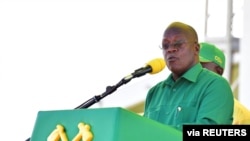Press freedom groups and journalists have accused Tanzania's government of silencing critics of President John Magufuli ahead of the October 28 election. Tanzanian authorities this year suspended a number of media groups from broadcasting or publishing, raising concerns about growing censorship.
As Tanzanians prepare to vote for a president on October 28, press freedom groups say media critical of the government have been targeted in a campaign of intimidation.
The Media Institute of Southern Africa in Tanzania (MISA) says that in the days leading up to the election, they have recorded a number of incidents of police harassing reporters.
MISA Chairperson Salome Kitomari says the organization has been trying to work with the police to ensure journalists are protected.
She says there have been incidences of journalists attacked or targeted when performing their duties and this is what made them collaborate and discuss the issue. Police should first inspect areas where political events are held to ensure that they are safe for journalists, says Kitomari, and also to advise them.
Allegations of censorship have increased in the run-up to Tanzania’s election, with communications authorities suspending and fining several media that reported opposition criticism.
Online channel Kwanzaa TV lost its license after posting a speech by opposition leader Tundu Lissu, which authorities called seditious.
President of the Tanganyika Law Society Rugemeleza Nshala says authorities are using the law to whittle away at press freedoms.
He says Article 18 of Tanzania’s constitution guarantees people’s right to search, access, and disseminate information," said Nshala.
"It doesn’t have any restrictions, says Nshala, it is clear. It does not say your right is according to the law, he says, but the right thing is only for people to share valid information. So, concludes Nshala, it is high time the government respects that.
Khalifa Said is an independent, investigative journalist who lost his job in March at a leading English newspaper in the country, The Citizen.
He was fired after tweeting that the opposition should take to the streets to demand a new constitution instead of waiting to be elected.
Said says fear and self-censorship have become the norm among Tanzanian journalists.
“Fear of being denied of press cards when you're current (one) expires, fear of being kidnapped, fear of being charged with money laundering… So, all these factors, all these issues make any journalist in Tanzania think twice before doing any particular story,” he said.
Tanzanian authorities have dismissed accusations that press freedoms are being limited and say that all media can operate as normal - if they obey the law.
The Reporters Without Borders 2020 World Press Freedom Index ranks Tanzania 124th out of 180 countries.

